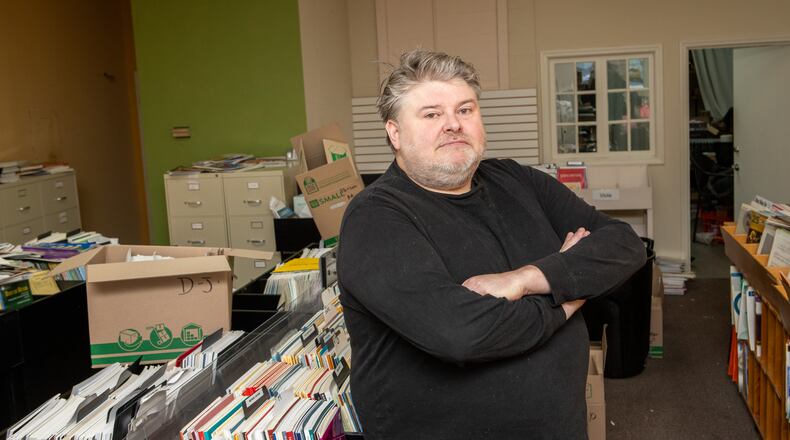At the end of this month a familiar feature of the downtown Decatur landscape will disappear.
Opus 1 Music, a sheet music shop that has been introducing young students to Chopin and Mozart for more than 50 years, will close its doors.
“It’s a little bit like a divorce or the loss of a parent,” said voluble owner/operator David Highsmith. “I’ve wept a few times, I’m not ashamed to say.”
Credit: Jenni Girtman
Credit: Jenni Girtman
Opus 1 is that increasingly rare bird, a sheet music-only store, which does not sell guitars, strings, pennywhistles or ukuleles.
“People aren’t buying sheet music now,” said Frank Hamilton, an Opus 1 customer and leader of a music school in Decatur. “You can stream everything, or you can download it on the net.”
Highsmith, 54, a bear-like man with a rapid-fire line of patter, said he is looking for another location in Decatur. The challenges are arrayed against him, from the high cost of commercial rents in Decatur to the dominance of online sales.
Internet shopping has even lured Decatur resident Susan Ottzen, a steady customer of Opus 1, who has been teaching piano and harp for 35 years.
“I had to do a classical harp recital up in Sautee Nacoochee and he had all this music for us,” said Ottzen of Highsmith. “He had everything at his fingertips,” including the English kitchen garden suite by Briton Paul Read and an arrangement of the cantina band tune from “Star Wars.”
Credit: Jenni Girtman
Credit: Jenni Girtman
But, said Ottzen, these days she sends her students to Amazon, or the website of music publisher Faber, to buy their method books. One reason: traffic. “Over the years it’s gotten so hard to even park over there.”
Opus 1 Music opened in the First National Bank building in 1971, then moved to the current location in the 1990s, according to Highsmith. He and his mother, Anita Highsmith, took over the lease in 2001.
A graduate of Druid Hills High School, the son had played clarinet in the Atlanta Symphony Youth Orchestra, earned a BA at Emory and a masters in clarinet performance at Georgia State University.
About five years ago Hutchins and Rea, a notable Atlanta sheet music retailer, was also turning away from in-person sales, and Highsmith bought their huge stockpile of sheet music.
That inventory, and Highsmith’s deep familiarity with the classical repertoire, made him a great resource for teachers seeking appropriate level books for their advanced students and for professionals hunting down specific editions.
“His wealth of knowledge is unmatched,” said Nick Edelstein, owner of Village Music in Avondale, which offers lessons, some sheet music, and sells some musical instruments. If it’s Schubert, Debussy, movie music from the 1980s, roots music from Ireland, Scotland or Africa, Highsmith will have it, said Edelstein, a customer of Opus 1 for the past 15 years.
“We need Beethoven, we need Mozart, and we don’t have them right now,” said Highsmith one day, as he moved around his modest shop, emptying his shelves. “It bothers me no end to see a student that’s not introduced to Bach in high school.”
Scattered around him was the flower of Western civilization from Alban Berg to “Zarathustra.” Here was the newest Barenreiter edition of Beethoven; there was the Mendelssohn section, with compositions by Felix, for sure, but also by his big sister Fanny; yonder was Debussy, Grieg, Gershwin, Mozart, but also “The Real Book” (B flat edition) and a book of transcribed solos by Miles Davis.
The somewhat-chaotic panoply is catnip for a professional such as Susan Gregg, who needs methods books for her violin and piano students, but also buys, on impulse, for herself.
“It’s always a mess in there, and you can find things you’re not looking for,” she said.
Said Hamilton: “When you couldn’t find music at other places, you would go there and I knew that he would carry it, and he was always very helpful.”
The trend that took away the pocket-sized Opus 1, and the 13,000-square-foot Brodt Music Co. in Charlotte, North Carolina, is happening all over the world, said David Jahnke, senior vice president, North America, at Hal Leonard, which calls itself the world’s largest sheet music publisher.
Print-only retailers are disappearing, said Jahnke, while online retailers are booming. “Consumers assume they can go to the web and find whatever they want,” which absorbs both the education dollar and the impulse buyer.
There are niche shops, Jahnke said. “There are some retailers out there that only sell guitar pedals.” But the problem with sheet music as a niche is that “the average retail price is $12 to $15. You’ve got to sell a lot every day,” to keep the doors open.
Those that survive are the diversified shops that sell music and musical instruments, that have a robust online presence and give lessons.
Highsmith sees rising real estate values and additional parking pressures in the future, prompted by the recent announcement that Hilton will build a 241-room hotel immediately across Ponce de Leon Place from the shop. Shirley Baylis, the city of Decatur’s business development manager, said the new facility is described as a “zero parking hotel” that will use space in adjacent parking decks.
Some teachers have been buying up portions of Highsmith’s stock at discounted prices. “I took like three boxes,” said Edelstein. “It seemed like a mountain of books, but it barely made a dent.” What’s missing from his purchases, said Edelstein, is the Highsmith personality and the Highsmith gift of gab.
“Anybody who walks in,” said Highsmith, “I was glad to talk to them, play something, let them hear it. Occasionally the light bulb goes off in their head: ‘Wow! This is great!’ And that’s such an exhilaration for me.”
.
About the Author








